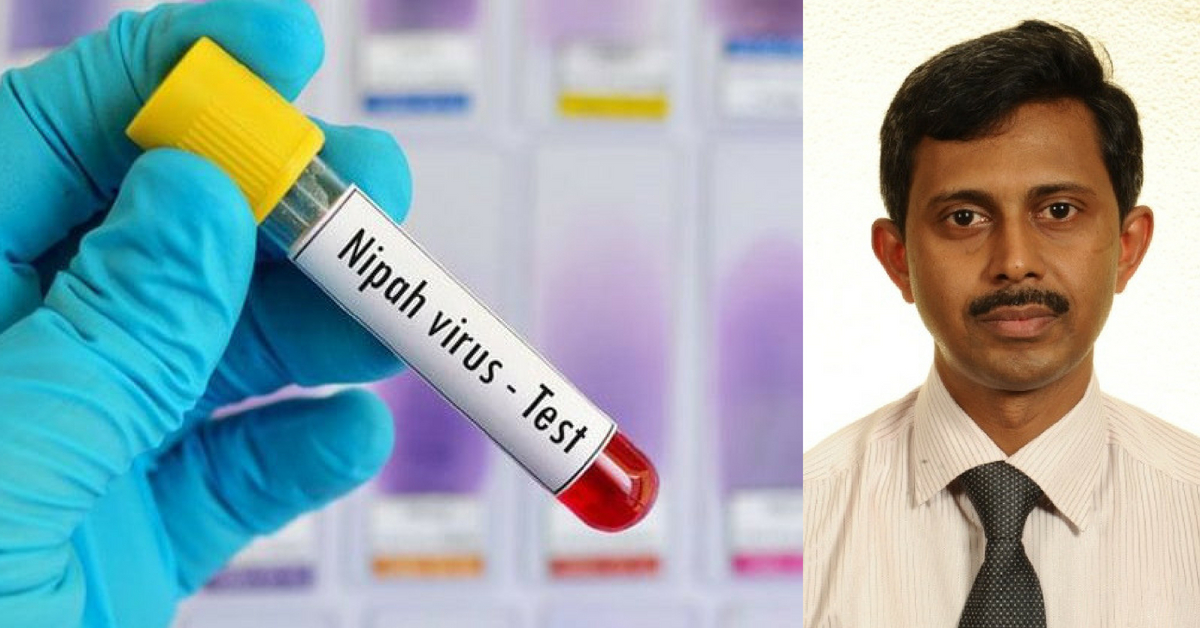This Karnataka Doctor Is At The Forefront of The Fight Against Nipah Virus
He played a significant role in diagnosing the second patient affected by the Nipah virus, which created awareness about it, and helped drive action before an epidemic could silently break out.

The Nipah virus has created a wave of panic across the country. As the death toll continues to rise, the government of Kerala and medical authorities are trying their best to create awareness and take preventive measures to stop the deadly virus from spreading its tentacles any further. Read more about the Nipah virus here.
The death of Lini Puthussery, the nurse who treated the first victim at Kozhikode’s Perambara hospital, highlighted the constant threat that caregivers and medical staff are exposed to while dealing with such epidemics.
Her heartbreaking final note to her husband moved the country, and she was hailed as a martyr, who succumbed to the virus while relentlessly serving those affected by it. You can read her note here.
Today’s story is about yet another person who is at the forefront of the fight against the deadly virus.

As reported in the Times of India, Dr G Arunkumar, a Microbiologist who heads the Manipal Centre for Virus Research (MCVR), under the Manipal Academy of Higher Education, is working in Nipah-hit areas of Kozhikode and is in constant touch with the medical community and the state government.
He played a significant role in diagnosing the second patient affected by the Nipah virus, which created awareness about it, and helped drive action before an epidemic could silently break out.
The Nipah virus is being compared to the life-threatening Ebola virus, and it would have been easy for any suspicion of the existence of the virus to be swept under the rug if it wasn’t for microbiologists like Dr Arunkumar, who acted on their instinct and tested the affected persons to check its presence.
Speaking to the Times of India, Dr Arunkumar says, “The infection began with one person in a house in Kozhikode and spread among the family members. The other cases occurred in the hospital where the family was treated. Now, all precautions have been taken to prevent further hospital-based infections. These efforts have been replicated in the community too.”
He expressed how it was difficult to diagnose the virus in the early stages of the first case because the patient died before the test which requires a sample of body fluids (such as a throat swab, blood, urine and cerebrospinal fluid) could be administered.
Fortunately, the second patient was administered the test in time, and the samples were sent to the Manipal lab. In less than 12 hours, the results revealed that samples tested positive for the Nipah virus, and the entire medical community was pushed into a state of high alert.
“The first patient died suddenly, and we could not administer the test. The second patient from the same family was admitted on May 17, and we obtained and tested a sample of the patient’s body fluids on May 18. Once the results were out, we realised that we were dealing with a rare virus. Unfortunately, the second patient died, but an epidemiological link between the two cases was proven,” says Dr Arunkumar.
He adds that currently there are only two labs in the country including the National Virology Institute and MCVR, both in Pune which are equipped with the required advanced Biosafety level 3 lab to deal with the rare and highly infectious virus.
READ MORE: Kerala Nurse Dies While Treating Nipah Patients, Moves Nation with Final Words
He reiterates how the medical staff treating the affected patients in the ICU continue to be at high risk.
“When the patient is in the ICU, the body fluid secretions and airborne infections are more. So the risk of transfer increases greatly. That is why employees of a hospital are most vulnerable to infection,” he told TOI.
As he continues his battle against the deadly virus, he also requests the general public, which is in a state of frenzy, to not panic as the measures to control Nipah are being put into place.
(Edited by Gayatri Mishra)
Like this story? Or have something to share?
Write to us: [email protected]
Connect with us on Facebook and Twitter.
NEW: Click here to get positive news on WhatsApp!
If you found our stories insightful, informative, or even just enjoyable, we invite you to consider making a voluntary payment to support the work we do at The Better India. Your contribution helps us continue producing quality content that educates, inspires, and drives positive change.
Choose one of the payment options below for your contribution-
By paying for the stories you value, you directly contribute to sustaining our efforts focused on making a difference in the world. Together, let’s ensure that impactful stories continue to be told and shared, enriching lives and communities alike.
Thank you for your support. Here are some frequently asked questions you might find helpful to know why you are contributing?


This story made me
-
97
-
121
-
89
-
167











